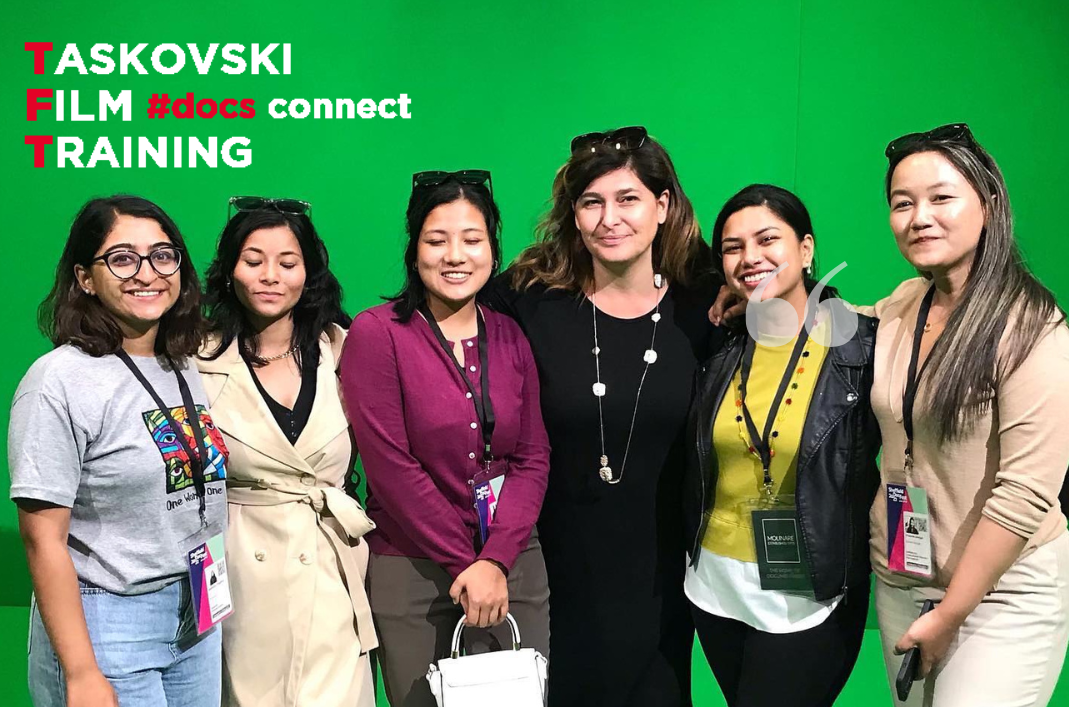
Five Nepali filmmakers, Aashruti Tripathy, Pinki Sris Rana, Prashansha KC, Prasuna Dongol, and Smriti Basnet, have arrived at DocFest in search of financial partners for their projects and to network with the great and the good of the international doc scene. They are in Sheffield as part of British Council’s Gender Film Programme led by #Docs Connect Taskovski Film Training in collaboration with Nepal Female Filmmakers, Pame Film and Music Festival, and Film Development Board Nepal.
“This collaboration with the British Council Nepal led by Nischal Oli and in UK office Jay Arnold, is a further step towards building a stronger documentary filmmaking base in Nepal,” comments Taskovski Films founder, Irena Taskovski, CEO & Founder of Taskovski Films whose #docs connect programme is core to the training.
“We are happy to support this cohort of Nepalese women filmmakers. We have been helping them develop their local stories that can be internationally recognised. Over the six months, we have conducted individual sessions and group sessions with international tutors. Sharing resources, and watching films have been another important part of the training. Another main aim of jointly initiating this specific program is to provide these young women with the opportunity to travel to Sheffield DocFest and learn how to prepare for industry events, meet possible collaborators and present their ideas,” Taskovski adds.
Aashruti Tripthath’s documentary As I Walk details the life of an indigenous woman and her remarkable story of how she wants to bring revolution through a cycle. Pinki Sris Rana and Prasuna Dongol are working on personal documentaries. Rana’s Awasesh – Residue of the Past details the generational injustice to vulnerable communities while Dongol’s Two of Me is an intimate exploration of a mother-daughter relationship. Prashansha KC comes with Iron Gate, described as “a bold and experimental documentary on child marriage, narrating experiences of her own mother who was married as a child.” Smriti Basnet runs her own company and is looking to hook up with like-minded producers who want to produce documentaries that present previously unheard narratives, as well as set up an impact lab in Nepal.
Taskovski explained to Business Doc Europe how during her #docs connect programme participants are offered all-encompassing, holistic training, connecting everything from the creative process of development, producing, festival strategies and (impact) distribution to get the project out into the world to the widest possible audience. “[Producers and filmmakers] know how to produce and produce in their own countries. But often they don’t know about the possibilities to collaborate in the international market. So we focus on development and distribution, where people from around the world bring creative, auteur-driven stories, and with our year-long workshops and certified training programs we guide them to find a way how to make these authentic stories cross borders and make impact,” says Taskovski.
Top-level contributors to the #docs connect programme in 2022 have included top UK docmaker Kim Longinotto, UK Producer Tora Young, award-winning filmmaker Morana Komljenovic (UK/Croatia) and Charlie Phillips, former head of documentaries at The Guardian, now back at Sheffield as executive producer of the Industry Program.
As importantly the #docs connect programme looks to maintain and improve the wellbeing of its participants. “Therefore as part of our training programmes we offer the tools on how to [practise] mindfulness, to reduce the stress and take care of yourself while producing or directing or distributing your projects,” Taskovski adds.
Another core element within the #docs connect offer is the concentration on what Taskovski calls ‘conscious leadership.’
“How do we collaborate as filmmakers?” she asks. “We, as filmmakers, have a power to inspire and to create the change in the world, to make impact. But at the same time, we sometimes compete, we don’t really collaborate. So ‘conscious leadership’ is actually a technique that I’m trained in and shows us what we stand for, what are our values. It helps us realize that all of us, as filmmakers and members of the film industry, we all have the same aim. We are making films either to entertain people, or to make a point and change certain things in society. So we cannot be competing. Instead we should be creating an eco-system of collaboration as we are pursuing the same aims towards greater good with our films.”